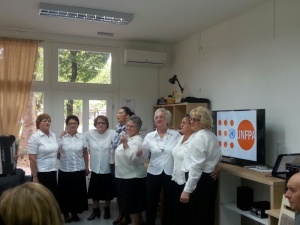
Today, as we observe the International Day of Older Persons, we must ensure that cities respond to the needs of persons of all ages and that older persons are as much a part of urban life as their younger counterparts.
This year’s theme of Sustainability and Age Inclusiveness in the Urban Environment fits in perfectly with the objectives of the recently adopted 2030 Agenda for Sustainable Development: leave no one behind! Together, we must ensure that older persons are fully integrated in cities’ economic, social, political and cultural life.
In Bosnia and Herzegovina, Population Fund of UN supports governmental institutions in developing strategies for ageing and youth. The strategies aim to ensure sustainably age inclusiveness in both urban and rural environments. Strategies will also make provisions for affordable and accessible health-care services, lifelong learning and retraining opportunities, and flexible employment for older persons to improve their well-being and facilitate their integration into the fabric of communities.
Today, representatives of the UNFPA, governmental institutions together with older persons and youth celebrates International Day of Older Persons in Centers for Healthy Aging in municipalities of Novo Sarajevo and Modrica. Dr. Doina Bologa, UNFPA Representative in BiH stressed that for the past 25 years, 1st of October is celebrated by raising awareness about issues affecting the elderly and it is also a day to appreciate the contributions that older people make to society. Older persons should be given the opportunity to contribute to development and should share in its benefits. We must ensure that older persons can live healthy, productive lives and make full use of the skills and abilities they have acquired. This will not only benefit older persons—it will benefit society as a whole.
Ensuring sustainability and age inclusiveness in the urban environment means creating a society for all ages where the voices of all generations are heard and where the needs of both young and old are met. It means empowering young and old to fully participate in the economic, social and political life of their communities. It means gathering data on city residents and their needs and working to ensure that they are adequately met. It also means sharing experiences about what makes a city a great place to live in for both young and old, concluded Dr.Bologa.


